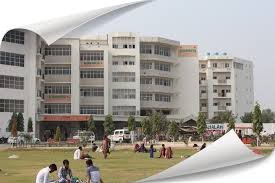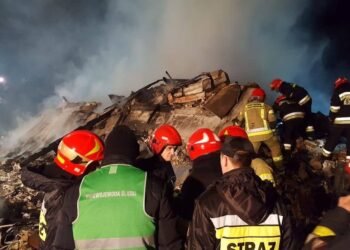Founder Jawad Ahmad Siddiqui, a former Jamia lecturer, was once jailed for financial fraud before reinventing himself as an education entrepreneur. His past now returns to haunt him as the university faces its biggest scandal yet.
BY PC Bureau
The National Investigation Agency (NIA) has widened its probe into the November 10 Red Fort blast, placing Faridabad-based Al-Falah University and its affiliated trust under the scanner. Early morning searches were carried out at the Al-Falah Trust headquarters in Faridabad, with investigators seizing documents, electronic devices, and financial records. Officials said the raids were part of efforts to trace possible links between individuals associated with the university and the suspects arrested in the terror case.
Simultaneously, NIA teams also conducted searches at Al-Falah’s Delhi branch office, examining its administrative and funding channels. The university came under national scrutiny after reports surfaced suggesting that one of the accused in the blast had professional or academic connections to its medical college. Authorities are now probing whether any institutional resources or contacts were misused for radical or subversive activities.
The Al-Falah University, once seen as a rising centre of education and opportunity for students from across north India, now finds itself mired in one of the country’s most serious terror-related investigations. What began as a promising private university with modern infrastructure and diverse academic programs has now become the subject of multiple government inquiries — spanning allegations of terror links, fund mismanagement, and regulatory fraud.
Sources said Al-Falah University’s fundings to be looked into, ED, CBI and Economic Offences wing to join NIA in the probe
On Thursday, the National Assessment and Accreditation Council (NAAC), an autonomous body under the Union Education Ministry, issued a show-cause notice to the university for falsely claiming accreditation on its official website. The move follows a cascade of negative publicity after the November 10 Red Fort blast, in which 12 people were killed, and investigators linked several suspects to Al-Falah School of Medical Sciences, a constituent college of the university.
Delhi News: NIA Raids Al-Falah College In Red Fort Blast Case 4 Doctors Under Scanner | Delhi Blast #Delhi #DelhiBlast #DelhiCarBlast #NIA #DelhiRedFortBlast #DNAVideos
For more videos, click here https://t.co/6ddeGFqM3o pic.twitter.com/n8aIRwERr6
— DNA (@dna) November 13, 2025
From Model Campus to National Scandal
The Al-Falah School of Medical Sciences, established in 2019, was supposed to embody the university’s vision of “education for empowerment.” Within just a few years, it grew into a sprawling campus in Faridabad, filled with aspiring doctors and nursing students. However, that dream now lies tainted.
The Enforcement Directorate (ED) and National Investigation Agency (NIA) have zeroed in on several individuals associated with the university, particularly doctors who were allegedly part of a Jaish-e-Mohammed (JeM)-linked “doctor module” that planned coordinated terror strikes.
Among those arrested is Dr. Shaheen Saeed, a former lecturer at the medical college, accused of playing a key role in radicalising students and colleagues. Investigators allege she used her influence to promote extremist ideology and was in contact with operatives connected to the November 10 blast outside Red Fort.
READ: ED Nabs Jaypee MD Manoj Gaur in ₹12,000-Cr Laundering Case
READ: Assam: Himanta’s ‘Miya…Miya…Miya’ vs United Opposition
Questions Over Campus Culture
According to sources familiar with the investigation, the university administration had been repeatedly alerted about “growing orthodoxy” on campus. Several senior staff members reportedly expressed discomfort over the increasing number of faculty hired from Kashmir, citing not their origin but the gradual change in the campus’s ideological atmosphere.
One source described how religious conservatism began to seep into everyday campus life: “Female staff were being encouraged to wear hijabs and burqas; sermons about purity and faith started replacing open discussions.” Yet, the university’s management chose to ignore these warnings, fearing political backlash or internal dissent.
Today, the same campus once promoted as a “model minority institution” is being dubbed by investigators as a “mini-Kashmir in Faridabad,” a phrase that reflects the growing unease around how easily ideological spaces may have been exploited by extremist elements.
Is Al-Falah University in Dhouj, a school of terror?
While VC Bhupinder Kaur Anand has sought to distance the university from Faridabad terror module, facts are shocking:
📍 Al-Falah hired Dr Nisar-ul-Hassan, sacked by J&K admin in 2023 for terror links. Without a basic… pic.twitter.com/cquTWMydUM— Frontalforce 🇮🇳 (@FrontalForce) November 13, 2025
The Man Behind Al-Falah: From Lecturer to Business Tycoon
At the centre of this storm stands Jawad Ahmad Siddiqui, founder and chancellor of Al-Falah University. Born in Mhow, Madhya Pradesh, in 1964 — the hometown of B.R. Ambedkar — Siddiqui’s journey is a story of ambition, reinvention, and controversy.
A BTech graduate in Industrial and Product Design from Devi Ahilya Vishwavidyalaya, Indore, Siddiqui began his career modestly as a Mechanical Engineering lecturer at Jamia Millia Islamia in the early 1990s. But his dreams soon outgrew the classroom. He co-founded Al-Falah Investments Ltd. with his brother Saood, promising lucrative returns to investors.
By 2000, however, the dream turned dark. Accused of embezzlement, forgery, and fraud, the brothers were arrested after several complaints from investors. The Delhi High Court noted in its 2003 order that signatures had been forged, deposits collected under fake companies, and funds diverted to personal accounts. Siddiqui spent over three years in Tihar Jail before securing bail and eventually being acquitted in 2005 after refunding the money.
After his release, Siddiqui turned toward education. With capital, political connections, and a knack for grand projects, he founded Al-Falah University, branding it as a centre for “progressive Islamic education.” Within a decade, it had grown into a massive institution — complete with a medical college, engineering institute, and business school — attracting thousands of students from across India and neighbouring countries.
Repeated Controversies
The Red Fort blast isn’t the university’s first brush with controversy. During the Covid-19 pandemic, Al-Falah’s nurses and paramedical staff protested after they were terminated for demanding life insurance coverage while treating Covid patients. Later, in 2023, medical interns were suspended for protesting poor infrastructure and unpaid stipends.
Despite these internal disputes, the university continued to receive state and central recognition, largely due to its founder’s political clout and business reach. But the current crisis is unlike any before — one that threatens not just the university’s reputation but its very survival.
A Tarnished Legacy
The NAAC’s notice over false accreditation has further deepened suspicion that Al-Falah was not just academically negligent but also institutionally deceptive. Investigators now suspect that several documents and certifications used to secure regulatory clearances may have been misrepresented or manipulated.
Meanwhile, students and parents are caught in limbo. Many enrolled at Al-Falah Medical College now fear their degrees could lose recognition. “We came here for a better future. Now our university is being called a terror hub,” said a final-year student who requested anonymity.
As the NIA’s investigation widens, founder Jawad Siddiqui—who turns 61 this week—faces a future far removed from the luxury of his Jamia Nagar mansion, “Al-Falah House.”
Once a man who built an empire on the promise of “success,” Siddiqui now presides over a crumbling legacy—where the pursuit of prosperity has been overshadowed by suspicion, scandal, and the spectre of terrorism.













